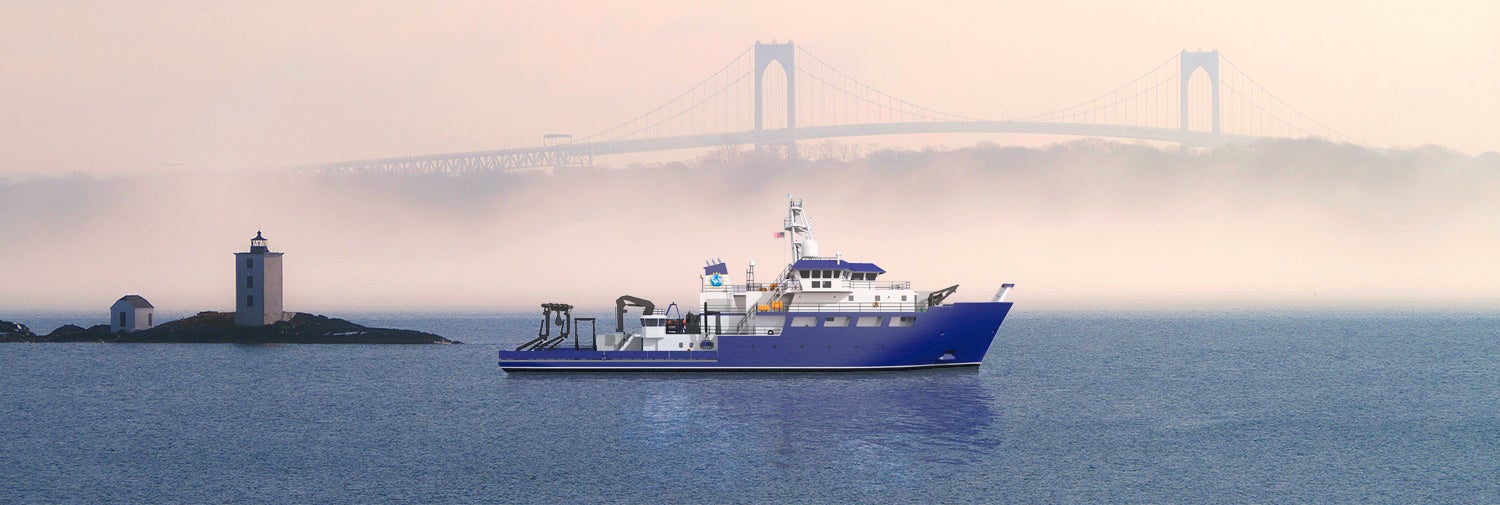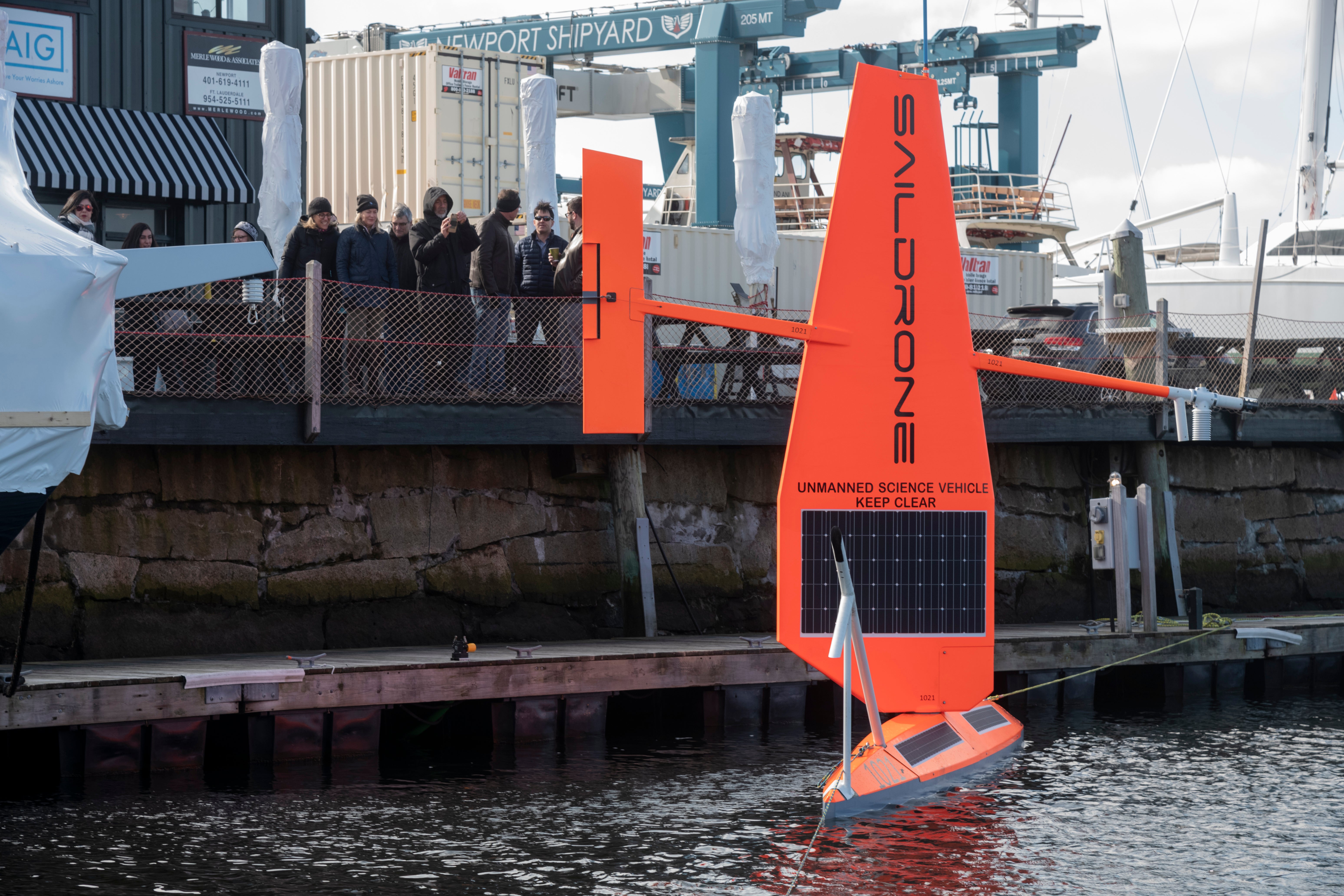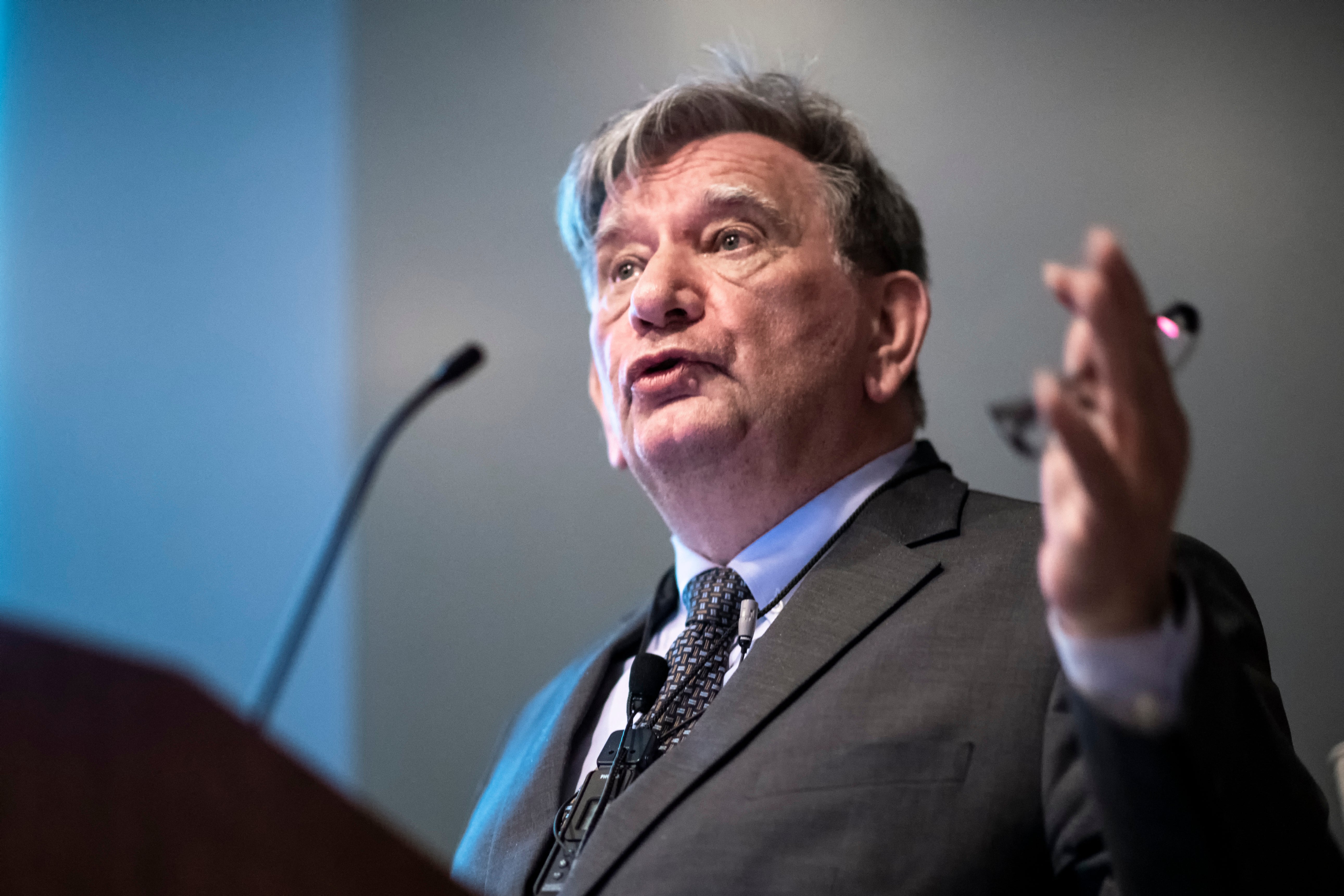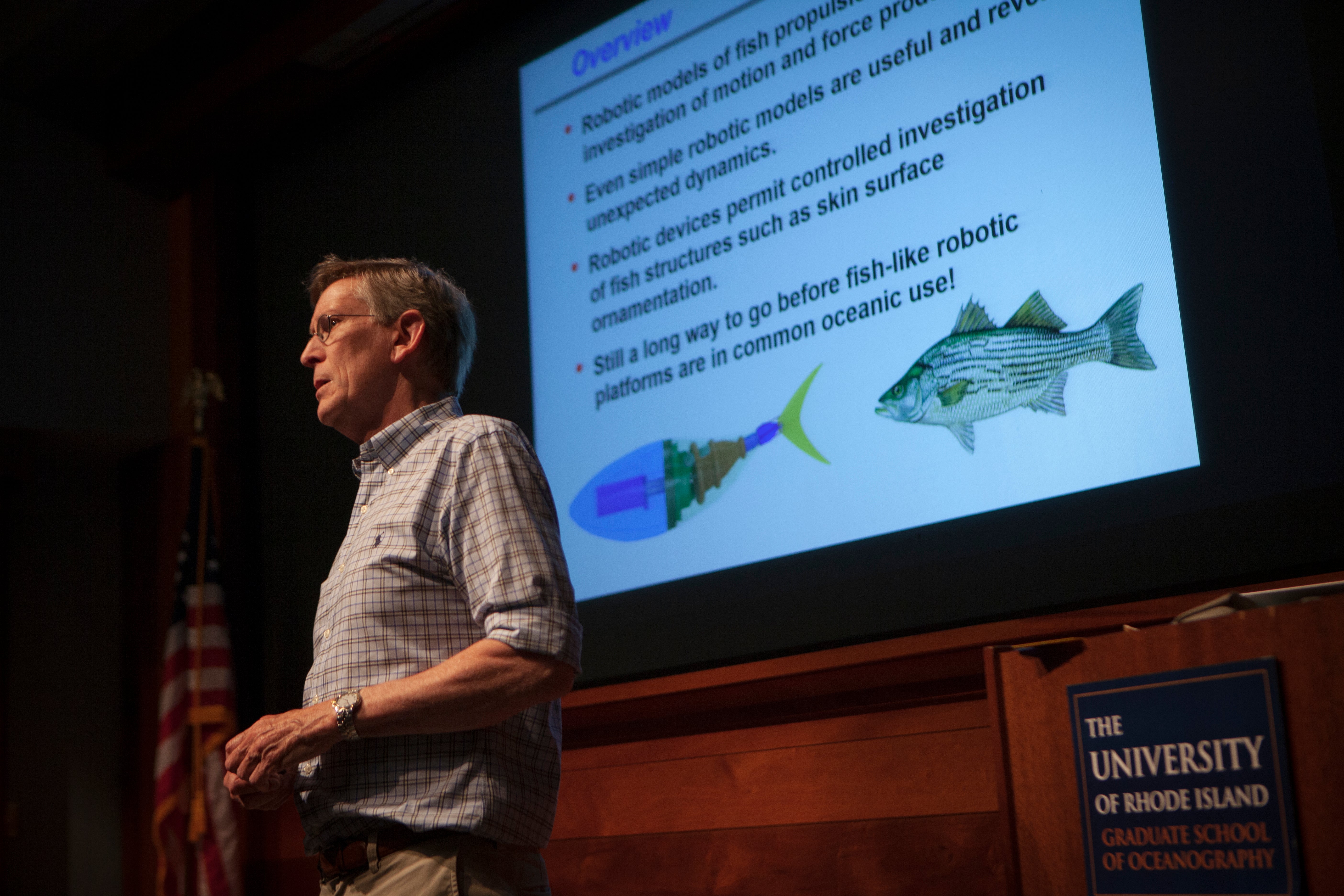
2018
![]()
GSO professor Jeremy Collie collaborated on a new cookbook published by the University of Rhode Island: Simmering the Sea: Diversifying Cookery to Sustain Our Fisheries. The book introduced 40 underappreciated fish and shellfish that populate the Northwest Atlantic and offers recipes for their preparation.
Artist and URI alumnus Eric Lutes memorialized R/V Endeavor through the contribution of his painting of the research vessel to GSO, with additional support from the Coastal Institute. Lutes crafted his detailed work over months interspersed with examination of photos and exploration of the research vessel herself.
Dennis Nixon, director of the Rhode Island Sea Grant Program and URI professor of Marine Affairs, received a “Service Recognition Award” from Senator Sheldon Whitehouse during the ninth annual Rhode Island Energy, Environment, and Oceans Leaders Day. The Coastal Resources Center (CRC) provided support to the annual event, with Director of U.S. Coastal Programs Jennifer McCann serving as emcee and Associate Coastal Manager Pam Rubinoff facilitating a session regarding the economic impacts of climate change.
![]()
R/V Endeavor hosted students participating in Science, Technology, Engineering and Math Student Experiences Aboard Ships (STEMSEAS), a program to enhance diversity in geoscience and oceanography.
![]()
GSO hosted a ribbon-cutting ceremony to celebrate the donation of the Greenfins Aquaculture Facility to the Narragansett Bay Campus. The 4,200 square foot facility was completed in 2017 as a public-private partnership between URI and alumnus Peter Mottur, co-founder and president of Greenfins Global LLC, a Rhode Island company focused on tuna aquaculture. URI President David Dooley joined Mottur, GSO Dean Bruce Corliss, College of the Environment and Life Sciences (CELS) Dean John Kirby, Provost Donald DeHayes and other officials for the ceremony.
![]()
Sen. Jack Reed visited to celebrate the East Coast Oceanographic Consortium’s (ECOC) successful bid to the National Science Foundation to operate a Regional Class Research Vessel (RCRV). Senator Reed has been a strong supporter of GSO and, in particular, the bid for the RCRV.
The Bay Campus community welcomed the public to the GSO Open House to discover the ocean science taking place along the shore of Narragansett Bay. More than 175 volunteers from GSO, URI’s Ocean Engineering Department, CELS, and R/V Endeavor crew staffed 30 exhibits and tours.
Rep. James Langevin led the Coastal Resiliency Symposium to examine extreme weather problems including storm surge and flooding as they affect the Rhode Island coastline. Sen. Sheldon Whitehouse and Jon White of the Consortium for Ocean Leadership also joined URI faculty who shared their expertise in modeling, mapping, and visualizing threats and their impacts; response and resiliency; and engineered hard structures and organic efforts to prevent and control flooding.
The Inner Space Center conducted the three-day Arctic Researchers and Informal Science Education (ARISE) Workshop for 47 Arctic scientists and education professionals from across the U.S. The workshop provided opportunities for broadening the impacts of Arctic research funded by NSF and introduced scientists to leaders in polar education.
![]()
On election day, Rhode Island voters approved Question 2 for Higher Education that included $45 million for the Narragansett Bay Campus to fund an upgraded and enlarged dock for the new RCRV, a marine operations building, and an Ocean Technology Building. The strong support from Rhode Island voters is based on a 50-year history of excellence thanks to the dedication and hard work of faculty, marine research scientists, staff and students at GSO, Ocean Engineering and CELS.
CRC hosted the annual meeting of the R.I. Marine Trades Association (RIMTA) for a workshop on “Science-based Planning for the Bay” and building the Blue Economy in R.I. Speakers included CRC’s Jen McCann, RI Sea Grant Director Dennis Nixon, Coastal Resources Management Council Director Grover Fugate, alumna Monique LaFrance Bartley and RIMTA Director Wendy Mackie.
![]()
Many GSO faculty, staff, students and alumni presented their research at the 2018 American Geophysical Union Fall Meeting in Washington, DC. GSO hosted a gathering for alumni, which also served as an opportunity to remember Bob Thunell (M.S. 1976, Ph.D. 1978) and his contributions to GSO and paleoceanography.
2019
![]()
Stephen (M.S. 1982) and Donna Greenlee made a $1 million gift to establish The Greenlee Family GSO Campus Redevelopment Fund to support construction of Bay Campus facilities. After earning his M.S. at GSO, Greenlee went on to a distinguished career with Exxon-Mobil focused on various technical and management assignments in research, exploration and production, and currently is president of Exxon-Mobil Exploration Company and vice president at Exxon Mobil Corporation. He is currently the vice chair of the Dean’s Advisory Council, on which he has served since 2016. Greenlee received the GSO Distinguished Achievement Award in 2011.
![]()
Dean Bruce Corliss announced the new RCRV will be named R/V Resolution. This choice follows the precedent set by Dean John Knauss when he named R/V Endeavor. In the 19th century, Captain Cook’s voyages of exploration were undertaken first aboard HMS Endeavour, then aboard HMS Resolution. R/V Resolution, therefore, continues to honor the historical importance of the Cook expeditions.
GSO continued its tradition of support for the National Ocean Sciences Bowl (NOSB), a competition intended to engage high school students in ocean science. GSO faculty, students, and alumni served as volunteers at NOSB’s regional (R.I./Conn.) competition—the 22nd annual Quahog Bowl, which was held on UConn’s Avery Point Campus. The volunteers also attended a lunchtime roundtable discussion with the high school students to share advice on preparing for a career in marine sciences.
GSO professor Jaime Palter helped launch a Saildrone mission in the Atlantic from Newport Shipyard with a suite of approximately 20 instruments to study ocean-carbon exchange in the Gulf Stream from Rhode Island to Cape Hatteras. Saildrones are wind- and solar-powered unmanned surface vehicles.
![]()
Carl and Pancha Peterson made a major gift to the GSO Campaign, a gift annuity that will support the Narragansett Bay Master Plan for either the Ocean Technology Building or to replace Horn Laboratory. Peterson serves on the GSO Dean’s Advisory Council.
At the winter meeting of the University-National Oceanographic Laboratory System (UNOLS), participants celebrated the residence of UNOLS at GSO for 10 years and thanked those who worked tirelessly over the past decade. While some staff continued with the UNOLS office at the University of Washington, others remain on the Narragansett Bay Campus to anchor the new Ocean Observatories Initiative Facilities Board (OOIFB) Administrative Support Board.
![]()
A packed crowd of Narragansett Bay Campus community members were treated to the 40th GSO Harpoon Seminar. The event, held appropriately on April Fools’ Day, is a chance for ocean scientists to show off their science-comedy chops. Walter Berry of the Environmental Protection Agency and Bob Sand of GSO have been organizing the seminar for the last 38 years.
Dr. Mary Grace Almandrez and Dr. Joanna Ravello from the Community, Equity and Diversity Office visited the Narragansett Bay Campus to begin a discussion on equity and inclusion at URI and to generate ideas on how the campus might go about addressing the needs of the community.
At the annual Scott W. Nixon Lecture, Dr. Pál Weihe, Head, Department of Occupational Medicine and Public Health of the Faroe Islands and Professor, University of the Faroe Islands, gave a talk called “PFASs Around the Globe: Effects on human health of oceanic pollution.” Dr. Weihe is a part of the URI-led Sources, Transport, Exposure and Effects of PFASs (STEEP) Superfund Research Program and has provided medical care to minimize exposures to marine contaminants for over 30 years.
The U.S. Naval War College sponsored a Naval Command College event at the Narragansett Bay Campus. A group of 55 senior naval and military officers from 52 countries spending one year in Newport learned about GSO activities, ships and future plans for the campus. URI President David Dooley, Director of Facilities and Operations David Palazzetti, and GSO professor Robert Ballard gave presentations.
GSO professors Colleen Mouw and Jaime Palter were promoted to associate professor in recognition of their significant research, education and outreach contributions at URI and at the national and international level.
Dr. George Lauder of Harvard University was the featured speaker of the annual Charles and Marie Fish Lecture. Dr. Lauder spoke about his work to develop robotic fish models—from simple, thin plastic panels to more complex tuna-like robots—and how they can help scientists better understand fish locomotor dynamics.
![]()
GSO professor Rainer Lohmann received a URI Research and Scholarship Excellence Award for 2019. Dr. Lohmann was recognized with the Advanced Career Faculty Research and Scholarship Excellence Award in the Life Sciences, Physical Sciences, and Engineering.
The National Oceanic and Atmospheric Administration (NOAA) announced that GSO will lead a $94 million Ocean Exploration Cooperative Institute (OECI) in partnership with the Woods Hole Oceanographic Institution (WHOI), University of New Hampshire, University of Southern Mississippi, and the Ocean Exploration Trust. The institute will be led by GSO professor Robert Ballard over the next five years and will explore and map U.S. territorial waters using the E/V Nautilus and NOAA Ship Okeanos Explorer, as well as the new RCRVs as they come online, including R/V Resolution.
The R/V Resolution keel-laying ceremony, which formally recognized the start of the ship’s construction, was held at Gulf Island Shipyards in Houma, La. Rhode Island Gov. Gina Raimondo, the ship’s ceremonial sponsor, inscribed her initials into the ship’s keel.
NOAA announced that GSO will join the Cooperative Institute for the North Atlantic Region (CINAR) led by WHOI. CINAR will carry out innovative, multidisciplinary research that will help inform decisions for sustainable and beneficial management of the U.S. Northeast continental shelf ecosystem.
![]()
At the 2019 Employee Recognition event, Dean Corliss joined the GSO community in celebrating the hard work and contributions made by faculty and staff, including recent retirees and employees marking 10, 15, 20, or 25-plus years of service.
Scientists with a NASA-led expedition collaborated with the Inner Space Center to explore the deep Pacific Ocean and prepare to search for life in deep space. NASA’s Systematic Underwater Biogeochemical Science and Exploration Analog (SUBSEA) research program merges the worlds of space and ocean exploration science. In August 2018, a team on board E/V Nautilus explored volcanic Lo’ih’i Seamount, south of the Big Island of Hawai’i. The project team returned to the Inner Space Center in late May and early June to test specialized mission-planning software as part of NASA’s long-term strategy for achieving extended human presence in deep-space.
Norwegian Ambassador to the United States Kåre R. Aas visited to learn about research and educational activities and to discuss the potential for developing collaborations between GSO and Norwegian universities. The visit was arranged by Senator Sheldon Whitehouse. GSO alum Sandra Whitehouse (Ph.D. 1994) accompanied the ambassador.
Scientists and journalists spoke at the Metcalf Institute’s 2019 Annual Public Lecture Series about how climate change is impacting water resources throughout the world. GSO faculty and students also participated in the Metcalf Institute’s 2019 Annual Science Immersion Workshop for Journalists by giving presentations and leading field excursions.
To identify how URI can contribute to the growth of offshore renewable energy and enhance Rhode Island’s Blue Economy, CRC organized a GSO-funded workshop entitled “Preparing for Offshore Renewable Energy in Rhode Island and Beyond.” The workshop featured a number of panel discussions on URI’s past and future engagement with the offshore wind industry and regulatory agencies.
GSO alums gathered with current students and post-docs for “Making Connections: An evening of professional development conversations.” The networking event provided students with advice for finding jobs and building a diverse resume, and perspectives on how their profession may change in the next 10 years. After the group discussion, everyone met in the Nautilus Galley for appetizers and the opportunity to ask the professional panel more questions.
Research Highlights
From July 1, 2018 to June 30, 2019, URI’s Graduate School of Oceanography was awarded more than $35 million in research funding. A few notable examples of funded projects are presented below.
The impact of groundwater discharges on coastal waters
Funding Recipient: GSO professor Rebecca Robinson
Funding Source: $503,438 from the U.S. Environmental Protection Agency
Purpose: To quantify the amount of groundwater discharged into southern Rhode Island’s coastal environment. These discharges are poorly estimated, yet are a significant source of nutrients and pollutants, which can lead to coastal hypoxia, habitat loss, changes in fisheries yields, and harmful algae blooms.
Zooplankton dynamics in the central Arctic
Funding Recipient: GSO marine research scientist Robert Campbell
Funding Source: $899,732 from the National Science Foundation
Purpose: To study how the biology and environment of the Arctic affect zooplankton, to understand their role in the ecosystem, and to describe how changes in the Arctic environment, such as loss of sea ice, may affect their survival.
Better understanding and predicting the loop current
Funding Recipient: GSO professors Kathleen Donohue and D. Randolph Watts
Funding Source: $2,078,240 from the National Academies of Science Gulf Research Program
Purpose: To increase our understanding of the Loop Current separation process and inform the current’s forecasting efforts. An array of 25 sensors deployed in the deep waters of the central Gulf of Mexico will measure currents and pressures in the full water column, from areas near the ocean floor to the surface. The Loop Current influences all types of ocean processes and has implications for a wide range of human and natural systems.
The role of surface gravity waves in air-sea energy transfer
Funding Recipient: GSO Marine Research Scientist David Ullman
Funding Source: $239,324 from the National Science Foundation
Purpose: To understand the role of surface gravity waves in energy transfer by linking the atmosphere and the ocean through a unique set of turbulence measurements. The project will create a data set that can be used to improve both weather and ocean conditions forecasts.





